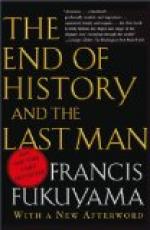|
This section contains 911 words (approx. 4 pages at 300 words per page) |

|
SOURCE: “The End of History, Explained for the Second Time,” in The New York Times, December 10, 1989, p. E6.
In the following essay, Bernstein discusses Fukuyama's defense and elaboration of “The End of History?” in The National Interest.
The debate about the “end of history” has not come to an end. Francis Fukuyama, the State Department official who declared the end of the ideological struggle between East and West in an article last summer in The National Interest, has responded to his critics, and taken the argument a step further.
Not only has history ended, Mr. Fukuyama argues in a crisply written eight-page essay to appear in the journal tomorrow, but human nature itself has changed. History has ended because our “democratic-egalitarian consciousness,” the highest form of political thought, has become “a permanent acquisition, as much a part of our fundamental ‘natures’ as our need for sleep or our...
|
This section contains 911 words (approx. 4 pages at 300 words per page) |

|


